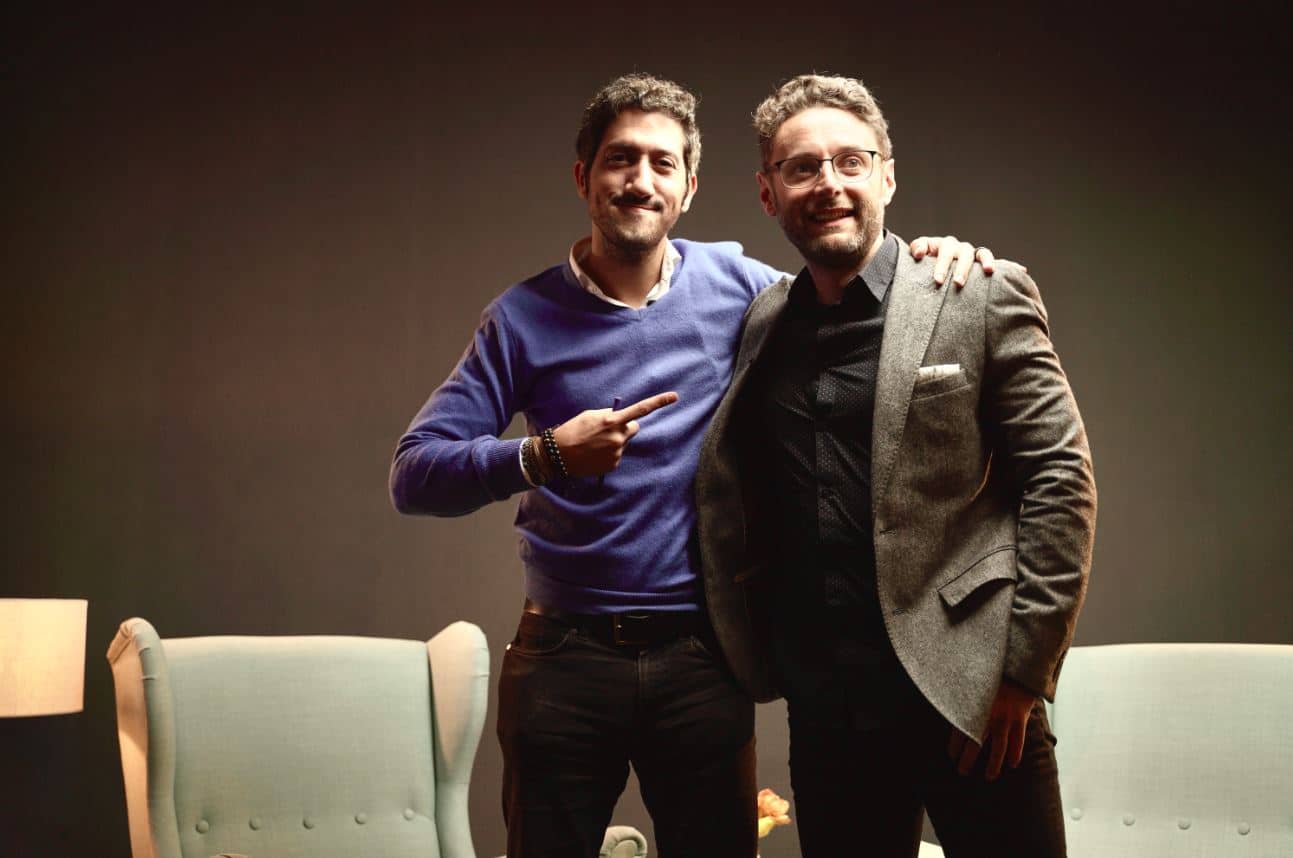In the first part of this interview with Christian Broughton, The Independent‘s Managing Director, Adam Singolda, Taboola’s CEO and Founder, and Christian discussed how the publisher uses Taboola Newsroom to make data-backed editorial decisions and inform its content strategy as it enters new markets.
In part two of the conversation, they talk about how The Independent uses data to meet business objectives, including finding new audiences and driving user registrations.
The two also chat on how a publisher’s role has grown and evolved in the face of the pandemic. As publishers are considered trusted sources on the open web, they have an opportunity to diversify and expand their business by tapping into the exploding e-commerce industry, something The Independent is doing with great success.
Christian touches on other initiatives, including expanding its implementation of Taboola’s Homepages For You to recommend personalized content across hundreds of homepages.
Watch the rest of the interview for key takeaways you can apply to your own publishing business, or read through the transcript below.
Here’s the complete transcript:
Adam: Yeah, it’s fascinating because really the biggest shift here is that it’s not using data that, that’s generic. So, you know, you can look at trends in the market and see what’s happening. This is about, um, extending your readers that actually vote Independent. They come to The Independent. They choose you. You know they love you. What do you do when they, when they leave? And that is, that is the biggest bridge, you know, because then you can also marry in different segments.
How do I think about subscribers? How do I think about, you know, loyal readers? And then, what did they specifically like? And then use that as a growth engine. I think it’s you’re, you’re, you know, you want the best stories we have at Taboola. I think specifically in all things to you because you are able to bring data and an editorial point of view, which is the hardest thing to do. Which it’s this, you know, it’s, it’s, there’s a glass ceiling to break, which is to bring a way, you know, things just to happen, bring that into the environment and change it.
Christian: Sure.
Adam: And now, you know, we’re able to speak about, uh, driving growth to journalism using both editorial-strong teams as well as data.
Christian: Yeah. I mean, it’s very nice you say it’s down to me. I don’t agree with that. I think it’s down to a lot of people in your – I think that the Taboola team are amazing individuals, and they’re an amazing team. Um, when I changed jobs and became managing director, um, just during lockdown and about just over a year ago. And in the first week of that, I just go.
I just have some massive Zoom call with, like, basically everyone on your team. I just got them all together. We had like John and Mark and Frankie and Jason and those people, but it was just like, and Nigel and everyone. And we just kind of laid out everything that I was doing.
Okay. I mean, I’m in this job now. I’m suddenly like, having spent like my whole life at this company, I’m now the new kid in a new job which I don’t fully entirely understand right now. So, I’m just going to take everything I’m doing, and then you can tell me how you can help me in the end. And it was great. And we just set that one thing up. And so many things came out of that.
For example, one of our big strategic pushes, and you just touched this. This is not just about kind of web traffic trends, which is what people think about when they think of web data. It’s deeper engagement stuff. And in Newsroom, there’s a whole thing of finding people that look like they should be subscribers or they’ve got subscriber potential. And actually, for us, yeah, we do subscription products, with two subscription products and, you know, they’re fantastic businesses, but we were putting a real emphasis on user registration. So, we want first-party data. So, sign up, have an account. We’ll customize the site a bit. We’ll give you a load of things like emails, et cetera. We’ll reward that. I’m finding those people suddenly became my challenge. So, I phoned up Nigel.
Adam: Of course.
Christian: Nigel, how’s this, you know? I can’t find a platform that can show me the users that are going to be… how can I customize messages to people that could register? And he said, ah yes. It’s really Newsroom. We don’t do that right now. And I was like, oh right, okay, fine. He said, but uh, let me come back to you. And then, sure enough, you know, a couple of weeks later, he’d come back. And it works.
That is great. And it’s a fantastic way of finding those people. So, you know, it’s good.It’s good that there’s data. I mean, it’s amazing. That’s the fundamental. It’, it’s, you’ve got the data. You’re the, as I say, you’re that company with the unique position of being able to show me readership data versus the market, like in real-time.
Adam: Right.
Christian: That’s amazing. But I don’t think it would be that powerful if you didn’t have the people. So the fact that you’ve got people who really enjoy working with us, it does feel like an extension genuinely of the team. It’s not just through me. It’s through a whole bunch of people on our side. Um, they all kind of matched up with teams in Taboola. And yeah, it’s been seven years now.
Adam: Seven years. Seven years of joy.
Christian: Seven years, and they’ve passed quickly. We’ve done a hell of a lot together in seven years. Um, it’s been fun. And now the thing is that everyone’s kind of got someone that’s matched up with them and really important. So, like Fran is one of the guys in your audience teams in New York, and yeah, he still checks in with all teams in New York. Now, when we’ve got people, people that we’re onboarding, he dips in, helps with the training, you know. So he’s actually kind of, he plays a really important role in training our new recruits, our like new reporters, or our new people in audience teams to just understand because good journalism doesn’t just connect.
And it’s not just about, like, audience growth and money and growing a business and opening offices. If journalism isn’t being read, like, really? When we, when The Independent still had print products, we had an editor. He had many catchphrases. He’s a very charismatic guy. And one of them was there’s great value in unread journalism. Like if you have that, you know, that kind of spread of the paper, that kind of makes you feel intelligent because it’s your paper. But it was, you’re not really gonna read it because it’s a bit daunting to look at, and you haven’t really got time. But there’s great value in having that because it says something about The Independent.
And actually, online now, if it’s unread, it’s just like ones and zeros on like a server somewhere. There’s really no merit in stuff that’s not being read. And if it’s been read in big enough numbers. We just did a whole presentation this week about what makes The Independent special, and the thing we came down to is it’s about making change happen. You know, people look around the world. They see massive problems. We’ve got, you know, crisis in leadership, then outlet political leadership across the world. Nothing bringing people together. Fractured societies. You know, we’ve got massive problems to deal with like whether it’s COVID or climate, things like that. And you’ve got to have journalism that connects people, informs people.
Adam: Especially now.
Christian: And if people aren’t really engaging with that, it’s just, you’re just missing the spot. Your journalism is just not as powerful as it could be. So it’s not just about the business side of it and revenue.
Adam: You mentioned connecting people and being at home, and how journalism is even more important because I need guidance, and I need advice, and I’m trusting the publisher that I’m connected to. But something, another thing that happened over the last year and a half, which led us to make a big bet on, on an acquisition we just made, was e-commerce. You know, we, we, we saw this phenomenon, you know. The New York Times here with the Wirecutter. CNET. Um, Meredith has a huge e-commerce business. USA Today has Reviewed.com. What we started seeing is big premium brands extending themselves, um, as a way to provide more value to consumers – reviewing products.
Christian: Yeah.
Adam: I just bought, by the way, uh, pans from my house because I love to cook. And I told my wife, I cannot make a decision without going to All Recipes. Please give me a moment. You know, and I went to All Recipes, and I checked some things out. And they, they give me advice. And I immediately made a purchase because I trust them. You know, and I trust them so much more than I trust Facebook or Instagram. And, um, so, so for me, especially now we’re home.
We can’t go to the stores as we used to. I think we’re more, you know, in many ways, you know, we’re almost at the future cause we’re making decisions to purchase things and interact with services like never before.
Christian: Oh, yeah, sure. A bit of a cliche, but yeah, like ten years of change have just happened in like a year because of lockdown. And e-commerce 100%. I mean, we saw our e-commerce revenues go up like 60 plus percent year on year.
I mean, it was huge. I mean, even now, we’ve got supply chain problems all across Europe, and the world, and America. Uh, we’re still seeing huge, huge lead into, into e-commerce and growth in the area. So, we have IndyBest, which is kind of shopping reviews site. We’re rebranding that to Independent Best. We’re investing in…
Adam: Is that a separate website?
Christian: It’s a connection. It is connected to – it’s called IndyBest. It’s now going to be Independent Best. It’s going to be the, uh, the name of the specific reviews area, but we’re actually going to blend it all the way through because we think it just delivers really good value back to, back to brands.
I mean, you know, if you take like outdoor advertising. I always pick on outdoor advertising. It’s kind of mean, but, you know, try and try and show me the, uh, the return on investment of that outdoor advert. Like, oh, and what do you do? You say, well, a thousand cars drove past, and five percent of them might’ve looked up at the advert.
And like you know that’s, what did that give you? Whereas if you’ve actually, you know, you’ve, if you can provide a service whereby you can, you can show people back. Actually, we drove these clicks that led to these sales. That’s pretty direct.
And as you say, for, for readers, they want to go to a company with, with real reach across multiple subjects, with who trust huge, huge trust metrics. And these publishers can do that. The Independent has got that. They’re the most trusted news brand out there, genuinely. You know, we outrank everyone on trust. Um, so if we can give you a really independent, unbiased view, good research on what one to buy, then, you know, you’re going to get some good pan at the end of it. And that’s probably what that decision is all about for you. So, it’s a good thing too. It’s great for news publishers.
Adam: So I, I, I love it. I’m convinced. I was, um, so I was, you know, on an analyst call. Now we’re a public company. And I said, you know, I said, I believe the open web will be, become like this huge shopping cart. We know we’re going to bring Amazon distributed to all these amazing publishers, and consumers will really appreciate the opportunity to, um, you know, consider buying things on the back of a publisher recommending them. It’s the right thing to do or, at least, giving them options. And then one of the analysts asked me a question which I’m going to ask you.
Christian: Okay.
Adam: And she asked me, you know, in the spirit of quality journalism, how do you, what challenges does an authority have writing content about products, which is so distant from what they used to write about? So, what are the challenges you face? And you know, if she’s listening, you’ll tell her what’s the answer.
Christian: Well, there are a couple of challenges. One is knowing what stuff to write about. So, knowing what your audience is into. That takes us back into like the last subject because Taboola Newsroom can also tell you, not just like new subjects, but it can tell you whether people are into watches or smartphones or, or, you know, in airports or whatever it may be.
But the other one is discovery. So, a lot of that is based on SEO. So, you know, well, that’s if somebody starts off with a web search and says, what’s the best pans to buy? There’s a good intent to purchase there. But actually, having that knowledge for people that are already on your site and going around your site is kind of harder. So, at that point, you need the user data. You need to, you need that first-party registered user data. Because if I can know a little bit about you, um, we can serve you with things that don’t feel like it’s kind of pestering you, with kind of, here’s an offer, here’s an offer. Here’s like some sort of spam mail kind of approach to, uh, giving you products to buy. We can actually hit that sweet spot of what you’re genuinely interested in.
Now, I think actually some of the walled gardens, you know, they have, you know they have data of, you know, advances in some ways here versus like individual publishers. But if you combine that with the Taboola network and you have that, you increase the size of that. Then you can get that richness of data for the open web, which is a really exciting opportunity.
So one of the things you need with that level of data is scale. You need to have like multiple, multiple sources of data there, and that’s where Taboola can come in because it has that for the open web. It has that scale of data across multiple sites. So it’s a very unique, uh, proposition there. Um, we also, that’s why we need to find these user registrations, so we’ve got first-party data.
The advantage that I think publishers have got over shops and over traditional stores is that I was chatting to a guy who sells advertising for a fashion brand, let’s say. I won’t say which fashion brand. He was saying that fashion brand really doesn’t have much first-party data because it’s a really, really famous global brand. Everyone, you know, watching the video, and you would have heard of it. Um, but they’ve usually been sold through other stores, so the manufacturer doesn’t really have a relationship with its customers. It’s just such an obvious thing. But now, in the e-commerce world, that’s a problem. That’s a really big problem for them.
Now for a company like The Independent, we can really, we can really fill out a very rounded profile if, you know if you’re reading stuff on our site. You know, I might know that you might be reading our cars section. Or maybe you like, you know, the cocktail bars section and, you know, seeing some reviews or those kinds of things. But we can pick up loads of different data points because we write about so much stuff from parenting, thank you very much, to travel to whatever it may be. So, we can actually, we can actually build a really rounded picture through that user data. I think that combined with the trust of the reach, that’s the real advantage, that’s a real opportunity in e-commerce.
Adam: So again, you’re using data as a way to kind of cross the chasm, to know where to begin and not spend a year running things and then find out that it’s not what you realized.
Christian: Yeah, yeah. Cause the opportunity is now. It’s really upon us. You know, it just happened so fast in the last year. Right?
Adam: I’m a big believer.
Christian: We can’t get it wrong.
Adam: I think by the way that, and I said, it’s probably a third of our revenue and is approximately a third of your revenue. That’s my belief, you know, in four years, it will be coming from e-commerce, from consumers making decisions to buy things, to book things on your site. And that’s a big deal versus what it looks like today. Uh, I think for the vast majority of publishers, e-commerce is up 10% of revenue. And I think it’s, it’s going to be a third, potentially even more, and especially because we have changed. And we will never, you know, I think about going to the doctor now, if some, you know, something, it hurts me.
It’s amazing to imagine that I used to wait two weeks to go to the doctor versus now I can click a button and talk to somebody in a minute. If I think about, you know, uh, online education, local traveling, buying food, all these services that are now taken for granted, it’s amazing to me that I used to do things differently a year and a half ago. And now that means I’m going to buy more, try more, do more, and there’s no better way to be exposed to those through publishers. I want to, you know, we’re coming to the end of this amazing session. We’ll hopefully, hopefully, we’ll have more teams later, but I want, I want to thank you. I want to thank you for, um, agreeing to have those drinks with me back in the day.
Christian: Thank you for that. I think you may have picked up the tab for those drinks. So, thank you for the drinks as well.
Adam: It paid off because, uh, I earned a partnership and friendship, and you’ve always been, um, you know, I think, you know, you mentioned people earlier, and I completely agree that at the end of the day, you know, uh, people do business with people. So we’re talking about data and technology and growth and pandemics and changes, but what’s the main commonality through all of this is just culture and people and friendship.
Christian: One hundred percent.
Adam: And I miss that the most, you know, in the physical world. You know, to be honest, we’re here in my office now, and it’s so nice to see people walking outside. So, I hope we’ll come back to that, um, more of that, because I’m not sure what that’s gonna look like. Um, but as we finish, I want to ask you kind of, when you think about the future, like, if you’re thinking about the future of The Independent, the future of publishers, maybe advice for us as Taboola, or companies like Taboola. What’s on your mind?
Christian: Well, I think you should definitely lock down your market research team because you’re, the numbers that you spoke about on e-commerce are very familiar. So, I’m going to present a plan for a 10X growth in revenue over a three-year time period, uh, to our board, uh, in a couple of weeks, so they are the numbers you just spoke about basically.
Um, the other one is, I mean, the other leap we’re making at The Independent is Independent TV. Um, I remember you telling me that the idea for Taboola came to you out of a frustrated moment watching TV at your mom’s house, and you couldn’t find something to watch. And you said this great thing. It’s like, why, why am I sitting here trying to find content. Why can’t the content find me?And that’s what, that’s the whole idea of the recommendations. So, something that we really back The Independent as a brand with a broadcast future. We think 100% we can do visual storytelling. We can do documentary. We can do lifestyle stuff. We’ve had extraordinary results. We’ve put 125% growth year-on-year on our video revenues in just 12 months since we lit this project up. So we’re really, really investing heavily into TV. And I see us on OTT, and I already want Taboola as part of that because finding what people want to watch is what it’s all about. Um, so that is a big one for us.
Yeah. I think really, uh, presenting news in a better way on homepages and surfaces is something that there’s still a long way to go. Uh, we’re currently doing a project with you called, well, I’ve called it a hundred home pages because Taboola was on our article pages, right? And it wasn’t on our home page, and it wasn’t on our section pages. And it was like, hmm, should we have it there? How can we have it there? And so we designed it to be in with your team are based in London. But also with, uh, actually, no, it’s with your team out of Tel Aviv who did this.
And, uh, we’ve worked with your team a lot over about a kind of six-to-nine-month period, and it’s still going. We now have a big area of our US, UK, and Asia home pages, which are currently being run, uh, by, uh, Taboola AI algorithm choosing, uh, recommending things for those individual consumers. It’s working really, really well. The click-through rate is really, really positive, but we want it to set the bar higher, and we wanted to say, not only is this is, this is this kind of machine learning approach going to find stuff that you’re really interested in, but we can apply it at a bigger scale than we could at a human level. So we just thought, what’s a level that’s kind of off the charts that no individual person could do? So we said one hundred home pages. So the homepage, the sports page, the politics page, the, I don’t know the topic pages around a certain sports team. Can Taboola and The Independent work out a way for even those subjects, those real niche topics?
Because of, you know, big, big web audiences are just built up of lots of little web audiences that are interested in certain things. But what you’re interested in probably isn’t the same as any other single reader of The Independent. You know, you are, you are you, and they are them, and everyone’s slightly different. So how can we treat that? Now the 100 home pages, we’re up to about, I think we’re into double figures now of where we’ve got it, so there’s a long way to go, but it’s a really exciting one for me.
Adam: This is a great place for us to stop. One hundred pages, a connected TV, expanding to help consumers discover things that they may love but never knew existed. Now I’m gonna do a cheers with you with coffee, and hopefully cheers…
Christian: Martini’s later.
Adam: Thanks for doing this.
Christian: Thank you.



